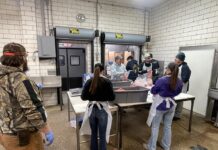Last month, I was in Arlington, Va., for a public issues conference for land grant university and cooperative extension types. It was an eclectic mix of USDA folks, university administrators, rank and file extension educators, and volunteers like me.
One breakfast was a working meal, and we individually selected which table to sit at based on the topic and the national program leader from the USDA’s National Institute of Food and Agriculture at that table who was to guide our discussion.
I chose the “animal well-being” table, and joined a group of 10 or so listening to Richard Reynnells, NIFA’s national program leader for plant and animal systems. Reynnells is extremely knowledgeable about animal welfare concerns and, in fact, has coordinated the annual symposium, Future Trends in Animal Agriculture.
“What we need,” suggested one man from Kansas, “is more science-based information in the media.”
Yeah, because that’s workin’ so well for us now, I thought, and before I knew it, I threw a challenge across the table.
“Why?”
He seemed a little taken aback, as if science was the only way we in agriculture would be able to gain consumers’ favor. But he really didn’t have a good answer.
No matter what the agricultural issue — animal welfare, conventional vs. organic, large vs. small farms — public opinion and support will only come when farmers start talking about why they farm, instead of how they farm.
I farm because watching crops grow from seed to harvest is one of nature’s grandest glories. I feel connected to the land.
I farm because I’m proud to be part of a family tradition.
I farm because I can be my own boss, and face a different challenge every day.
I farm because I love animals, and am proud to give them the best care Ii can.
I farm because it’s not a job, it’s in our blood. It’s our life.
Leadership and communication consultant Simon Sinek gets it. What’s your purpose, your belief, he asks? Why does your farm exist, why do you get out of bed in the morning and why should anyone care?
“People don’t buy what you do,” Sinek says, “they buy why you do it.”
We can read all the science-based information anyone throws at us, but it doesn’t necessarily drive our behaviors. Values do, emotions do.
“Great leaders all start with Why,” Sinek wrote in an article in Leadership Excellence magazine in November (link opens .pdf). “They tell you what they believe, their purpose or their cause and then ask you to join their cause.”
Yes, we need science to improve our farm management practices, but most people really don’t care about the science. They care about you, about why you do what you do. We have the great disconnect between farm and nonfarm dwellers because we’ve forgotten to share our passion, our why.
If you farm because you love plowing and planting and watching things grow, you’re also saying, “I want to protect the environment.” If you farm because you love animals, you’re also saying, “I care about animal welfare.” Ultimately, the why you farm can be seen in how you farm.
And when you start talking from your passion, and not your science, all of a sudden, farming becomes more relevant, more meaningful to everyone else, because they, too, want to protect the environment or care about animal welfare, and can do that by supporting you. You have shared values.
People don’t buy what you do, they buy why you do it.












That was wonderful!
Amy
@KyFarmersMatter on twit ;)
I love that the WHY is making its way into farming. It seems like the WHY is getting sucked out of it – the love and passion is bring replaced by science and industry.
At the end of the day, the WHY is not only what people buy, it is what gets us up in the morning. The clearer the WHY – the greater the passion AND the more innovation there is.
If there is ever an opportunity for me to come to speak to a large conference of farmers, I would love to.
Thanks for sharing the WHY.
I certainly support the farmers that grow my food… The crops, grains, fruits, nuts, vegetables, seeds, etc. But when it comes to the “why” of animal agriculture you just loose me!
We certainly don’t “need” to eat animals to be healthy… I’d like to know the “why” of doing so?
Excellent piece.
@Bea Elliott, the ‘why’ is because humans are omnivores and if we do not eat animals and their byproducts, we can never achieve *optimal* health. We don’t have to like that fact, but a fact it is. You don’t have to believe it, but just as someone who doesn’t believe in gravity will die if they jump off a 200′ cliff, well…
It is your right as an American to choose to eat vegan. That’s fine. But science has proven that humans (especially children) *must* eat animal protein – milk, eggs, meat – in order to have *optimal* mental and physical health. Those who choose not to live optimally are welcome to do so. But to ignore the fact that humans are omnivores is to imperil oneself, one’s children and our entire species.
… WHY animal agriculture? Because there is nothing so amazing and awe-inspiring as watching a first-time mama sheep give birth and know instinctively how to care for her younglings. Because it’s fun watching chicks hatch! Because it’s a wonderful feeling to know your 16 and 18 hour days will feed families and help children reach their potential. Because nothing beats life on a farm for teaching kids that giving is better than getting.
Thank you for your points too often those of us in Ag want facts to resonate with the non farming public however they make buying decisions on emotion. I have long said reach out with emotion, show our values and emotion then back that up with science and facts.
Buyers buy on emotion? I am seeing a large change toward science based buying. When confronted with hormones, pesticides, etc, most people I speak to are now more cognicent of what is in (or on) their foods. If you are just cementing in the idea that farmers should stick to their gut feelings about things, well then, with the money that corporate farms put out in media, etc, farmers will use whatever they “feel” like using on their crops/animals in order to gain production. I am sorry, but I think science is helping farming and farmers need to listern to science more than emotion. But science can be both good and bad. Science can produce wery unhealthy products as well as extremely healthy ones as well. So it is up to us, as consumers, to research the science being use and base our buying habits on that, and not the media hype and emotions.